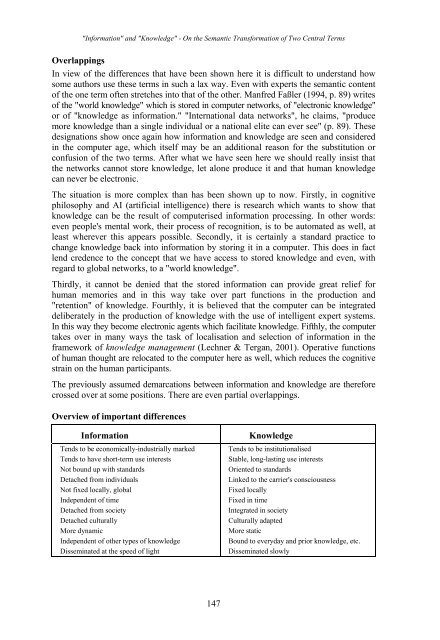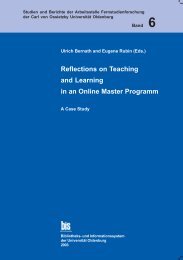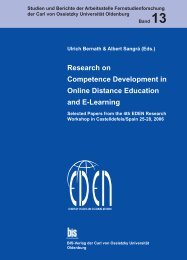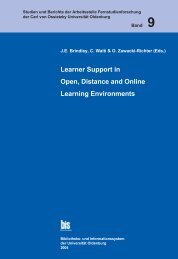Distance Education in Transition - Master of Distance Education ...
Distance Education in Transition - Master of Distance Education ...
Distance Education in Transition - Master of Distance Education ...
You also want an ePaper? Increase the reach of your titles
YUMPU automatically turns print PDFs into web optimized ePapers that Google loves.
"Information" and "Knowledge" - On the Semantic Transformation <strong>of</strong> Two Central Terms<br />
Overlapp<strong>in</strong>gs<br />
In view <strong>of</strong> the differences that have been shown here it is difficult to understand how<br />
some authors use these terms <strong>in</strong> such a lax way. Even with experts the semantic content<br />
<strong>of</strong> the one term <strong>of</strong>ten stretches <strong>in</strong>to that <strong>of</strong> the other. Manfred Faßler (1994, p. 89) writes<br />
<strong>of</strong> the "world knowledge" which is stored <strong>in</strong> computer networks, <strong>of</strong> "electronic knowledge"<br />
or <strong>of</strong> "knowledge as <strong>in</strong>formation." "International data networks", he claims, "produce<br />
more knowledge than a s<strong>in</strong>gle <strong>in</strong>dividual or a national elite can ever see" (p. 89). These<br />
designations show once aga<strong>in</strong> how <strong>in</strong>formation and knowledge are seen and considered<br />
<strong>in</strong> the computer age, which itself may be an additional reason for the substitution or<br />
confusion <strong>of</strong> the two terms. After what we have seen here we should really <strong>in</strong>sist that<br />
the networks cannot store knowledge, let alone produce it and that human knowledge<br />
can never be electronic.<br />
The situation is more complex than has been shown up to now. Firstly, <strong>in</strong> cognitive<br />
philosophy and AI (artificial <strong>in</strong>telligence) there is research which wants to show that<br />
knowledge can be the result <strong>of</strong> computerised <strong>in</strong>formation process<strong>in</strong>g. In other words:<br />
even people's mental work, their process <strong>of</strong> recognition, is to be automated as well, at<br />
least wherever this appears possible. Secondly, it is certa<strong>in</strong>ly a standard practice to<br />
change knowledge back <strong>in</strong>to <strong>in</strong>formation by stor<strong>in</strong>g it <strong>in</strong> a computer. This does <strong>in</strong> fact<br />
lend credence to the concept that we have access to stored knowledge and even, with<br />
regard to global networks, to a "world knowledge".<br />
Thirdly, it cannot be denied that the stored <strong>in</strong>formation can provide great relief for<br />
human memories and <strong>in</strong> this way take over part functions <strong>in</strong> the production and<br />
"retention" <strong>of</strong> knowledge. Fourthly, it is believed that the computer can be <strong>in</strong>tegrated<br />
deliberately <strong>in</strong> the production <strong>of</strong> knowledge with the use <strong>of</strong> <strong>in</strong>telligent expert systems.<br />
In this way they become electronic agents which facilitate knowledge. Fifthly, the computer<br />
takes over <strong>in</strong> many ways the task <strong>of</strong> localisation and selection <strong>of</strong> <strong>in</strong>formation <strong>in</strong> the<br />
framework <strong>of</strong> knowledge management (Lechner & Tergan, 2001). Operative functions<br />
<strong>of</strong> human thought are relocated to the computer here as well, which reduces the cognitive<br />
stra<strong>in</strong> on the human participants.<br />
The previously assumed demarcations between <strong>in</strong>formation and knowledge are therefore<br />
crossed over at some positions. There are even partial overlapp<strong>in</strong>gs.<br />
Overview <strong>of</strong> important differences<br />
Information Knowledge<br />
Tends to be economically-<strong>in</strong>dustrially marked<br />
Tends to have short-term use <strong>in</strong>terests<br />
Not bound up with standards<br />
Detached from <strong>in</strong>dividuals<br />
Not fixed locally, global<br />
Independent <strong>of</strong> time<br />
Detached from society<br />
Detached culturally<br />
More dynamic<br />
Independent <strong>of</strong> other types <strong>of</strong> knowledge<br />
Dissem<strong>in</strong>ated at the speed <strong>of</strong> light<br />
147<br />
Tends to be <strong>in</strong>stitutionalised<br />
Stable, long-last<strong>in</strong>g use <strong>in</strong>terests<br />
Oriented to standards<br />
L<strong>in</strong>ked to the carrier's consciousness<br />
Fixed locally<br />
Fixed <strong>in</strong> time<br />
Integrated <strong>in</strong> society<br />
Culturally adapted<br />
More static<br />
Bound to everyday and prior knowledge, etc.<br />
Dissem<strong>in</strong>ated slowly





